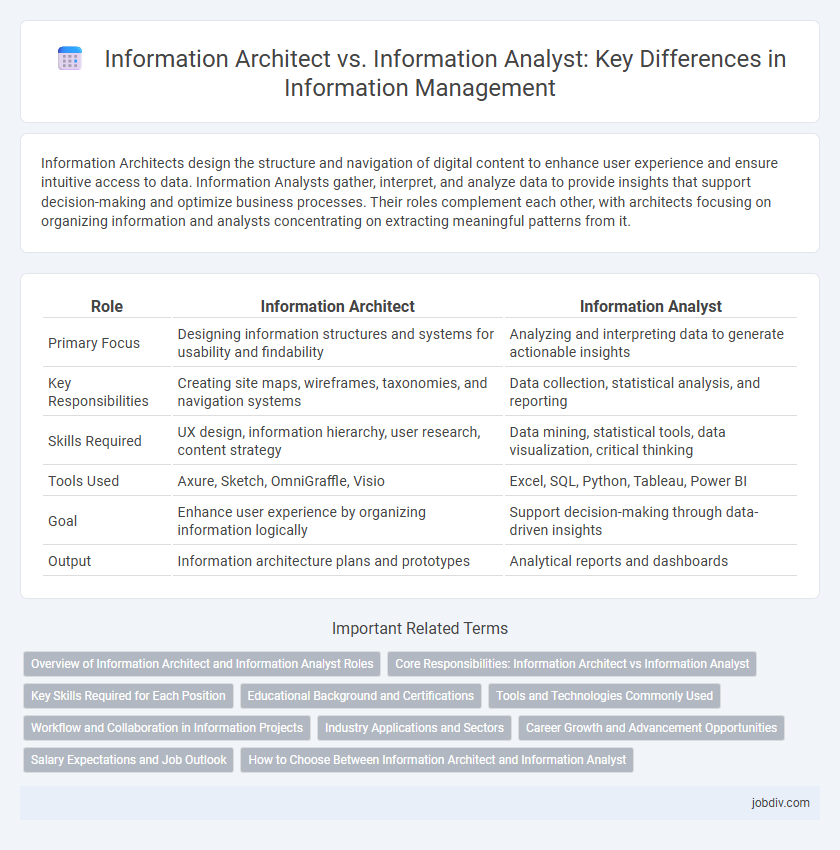Information Architects design the structure and navigation of digital content to enhance user experience and ensure intuitive access to data. Information Analysts gather, interpret, and analyze data to provide insights that support decision-making and optimize business processes. Their roles complement each other, with architects focusing on organizing information and analysts concentrating on extracting meaningful patterns from it.
Table of Comparison
| Role | Information Architect | Information Analyst |
|---|---|---|
| Primary Focus | Designing information structures and systems for usability and findability | Analyzing and interpreting data to generate actionable insights |
| Key Responsibilities | Creating site maps, wireframes, taxonomies, and navigation systems | Data collection, statistical analysis, and reporting |
| Skills Required | UX design, information hierarchy, user research, content strategy | Data mining, statistical tools, data visualization, critical thinking |
| Tools Used | Axure, Sketch, OmniGraffle, Visio | Excel, SQL, Python, Tableau, Power BI |
| Goal | Enhance user experience by organizing information logically | Support decision-making through data-driven insights |
| Output | Information architecture plans and prototypes | Analytical reports and dashboards |
Overview of Information Architect and Information Analyst Roles
Information Architects design and structure digital information systems to optimize user experience and facilitate intuitive navigation, focusing on taxonomy, metadata, and content organization. Information Analysts collect, analyze, and interpret data to provide actionable insights that support decision-making and improve business processes. Both roles contribute to effective information management but differ in their emphasis on system design versus data evaluation.
Core Responsibilities: Information Architect vs Information Analyst
Information Architects focus on designing the structure, organization, and navigation of information systems to enhance user experience and accessibility. Information Analysts specialize in collecting, interpreting, and analyzing data to identify trends and support strategic decision-making. Both roles are integral in managing data flow, but Information Architects prioritize system design while Information Analysts emphasize data evaluation.
Key Skills Required for Each Position
Information Architects require strong skills in user experience design, data modeling, and content strategy to effectively structure and organize information for optimal accessibility. Information Analysts must excel in data analysis, statistical tools, and reporting techniques to interpret complex datasets and provide actionable insights. Both roles demand proficiency in communication and critical thinking to translate information needs into practical solutions.
Educational Background and Certifications
Information Architects typically hold degrees in fields like information science, computer science, or design, with certifications such as Certified Information Professional (CIP) enhancing their credentials. Information Analysts often possess educational backgrounds in statistics, data science, or business analytics, supported by certifications like Certified Business Analysis Professional (CBAP) or Microsoft Certified: Data Analyst Associate. Both roles benefit from continuous learning through specialized courses and certifications aligned with evolving industry standards.
Tools and Technologies Commonly Used
Information Architects primarily utilize tools such as Adobe XD, Sketch, and Axure RP for designing user interfaces and creating wireframes, while also leveraging content management systems like WordPress and tools for user research like Optimal Workshop. Information Analysts rely heavily on data analysis and visualization tools such as SQL, Microsoft Excel, Tableau, and Power BI to interpret and present data insights. Both roles often use collaboration platforms like JIRA and Confluence to facilitate project management and communication within teams.
Workflow and Collaboration in Information Projects
Information Architects design the overall structure and navigation systems of information projects, ensuring intuitive workflows that support user needs and seamless content access. Information Analysts focus on data collection, interpretation, and reporting, enabling informed decision-making and continuously refining workflows based on analytical insights. Collaboration between these roles integrates strategic design with data-driven analysis, optimizing project outcomes and enhancing information management efficiency.
Industry Applications and Sectors
Information Architects primarily design and structure digital content in sectors like technology, e-commerce, and media to enhance user experience and navigation. Information Analysts analyze data patterns and business processes within finance, healthcare, and marketing to support decision-making and strategic planning. Both roles are critical in IT, telecommunications, and government industries for optimizing information flow and accessibility.
Career Growth and Advancement Opportunities
Information Architects excel in designing intuitive information systems, leading to leadership roles in UX strategy and digital product development. Information Analysts specialize in data interpretation and pattern recognition, often advancing into data science, business intelligence, and strategic decision-making positions. Career growth for both roles is robust, with Information Architects typically moving into senior design or management roles, while Information Analysts often progress toward analytical leadership and consultancy.
Salary Expectations and Job Outlook
Information Architects typically command higher salaries, averaging $95,000 to $130,000 annually, due to their strategic role in designing information systems and user experiences. Information Analysts earn between $60,000 and $85,000 per year, focusing on data interpretation and reporting to support business decisions. Job outlook for both roles remains strong, with Information Architects projected to grow 7% and Information Analysts 9% through 2030, reflecting sustained demand in data-driven industries.
How to Choose Between Information Architect and Information Analyst
Choosing between an Information Architect and an Information Analyst depends on project goals and data needs; Information Architects focus on designing the overall structure and flow of information systems, enhancing user experience and navigation. Information Analysts specialize in interpreting data, identifying trends, and providing insights for strategic decision-making. Assess whether the priority is organizing complex information frameworks or extracting actionable insights from data to determine the right role for your organization.
Information Architect vs Information Analyst Infographic

 jobdiv.com
jobdiv.com